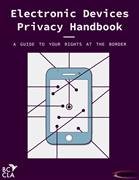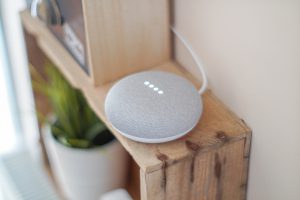2018 Bi-Monthly Update Series: July/August
To keep you informed, here are some highlights of changes and updates made to Clicklaw in July and August:
Jan-Feb | Mar-Apr | May-Jun | Jul-Aug | Sep-Oct | Nov-Dec
 Electronic Devices Privacy Handbook: A Guide to Your Rights at the Border
Electronic Devices Privacy Handbook: A Guide to Your Rights at the Border
by BC Civil Liberties Association
This handbook is meant to help you make sense of the current state of play with respect to electronic searches at the Canadian border and at US preclearance zones in Canada, and to provide tools to protect your privacy when traveling with electronic devices.
 Online Divorce Assistant Application
Online Divorce Assistant Application
by BC Ministry of Attorney General
This online app helps people complete documentation for joint-filing divorces in the Supreme Court of BC in cases without children. Joint-filed divorces are where both applicants agree on all family law issues relevant to their situation, such as spousal support and the division of family property.
![]() The Canadian Bar Association, BC Branch (CBA BC)
The Canadian Bar Association, BC Branch (CBA BC)
Many Dial-A-Law scripts have been recently reviewed. For a complete list of these resources, see their listings here (sorted by “last reviewed date”). Some of the updated scripts are:
![]() Traffic Court Guide: Guide to Disputing a Ticket
Traffic Court Guide: Guide to Disputing a Ticket
by the Provincial Court of BC
This guide deals with provincial violation tickets – for offences under BC laws, including traffic offences under the Motor Vehicle Act and regulations, and offences under the Liquor Control and Licensing Act.
- Roommate Guide – The guide is designed to help increase successful roommate situations. Includes information about roommate agreements, common roommate issues, and what to do when things don’t work out.
- Roommate Agreement – Single Tenancy – Occupants or Tenants in Common
- Roommate Agreement Forms – Joint Tenancy – Co-Tenants
 Elder Law Glossary
Elder Law Glossary
by Seniors First BC
Elder law and services for seniors are full of unique terms, phrases, and acronyms. We provide this glossary to help you look up this sometimes confusing terminology.
![]() West Coast Environmental Law (WCEL)
West Coast Environmental Law (WCEL)
- Back to top Infographic: Marine Protected Areas – Human activities like fishing, shipping and oil exploration increasingly put pressure on our oceans and marine life. This infographic highlights the benefits of Marine Protection Areas (MPAs) in Canada. Legal protections in MPAs can help save our seas.
- Infographic: Stronger Marine Protected Areas – This infographic explains why Canada’s Marine Protected Areas (MPAs) need updated and stronger legal protections. We need strong laws to help save our seas.
- Infographic: Oil and Marine Protection Don’t Mix – Along the Atlantic coast, the ocean does not have consistent protection from oil and gas development. Oil and gas is even permitted within the boundaries of Marine Protected Areas (MPAs). This infographic shows the inconsistent regulation of oil and gas across Canada’s coasts and MPAs.
- Guardian Watchmen: Upholding Indigenous Laws to Protect Land and Sea – For thousands of years, the Indigenous peoples of BC have protected and managed the lands and waters. Recently, through the creation of ‘Guardian Watchmen’ programs, nations have continued to uphold their governance responsibilities. Guardian Watchmen follow, enforce, and uphold traditions.
- A Legal Toolbox to Defend BC from the Kinder Morgan Trans Mountain Pipeline & Tankers Project – This brief highlights the tools BC has to stand up to Kinder Morgan.
- Infographic: Protecting BC’s Coast – This infographic outlines the need for two policy decisions, banning oil tanker traffic on BC’s North Coast and implementing a network of Marine Protected Areas (MPAs) on BC’s North Coast, as essential pieces of protection for BC’s rich natural resources.
![]() The Internet of Things
The Internet of Things
by Get Cyber Safe
The Internet of Things (IoT) refers to physical devices (smart/connected devices) that connect to each other via the internet. This website helps you understand how to protect your privacy and security if you are using them at home. It also has a section for small/medium business owners.
Reviewed & updated Common Questions
![]() With help from Seniors First BC, we have reviewed and updated the following questions:
With help from Seniors First BC, we have reviewed and updated the following questions:
- How can I help a person who cannot manage their own affairs?
- How do I apply for CPP retirement benefits?
- I am worried about an older adult who may be being abused or neglected
- I want information about subsidized housing for seniors
- I’m trying to decide whether to apply early for CPP
- What taxes will I have to pay now I’m retired?
- Where can I find out about benefits for seniors?
- Who can get the full old age security pension? Who is eligible for the Guaranteed Income Supplement?
Common Questions help narrow down the resources people should start with. Do you get asked the same questions over and over again by your clients? Send your suggestions to editor[@]clicklaw.bc.ca


